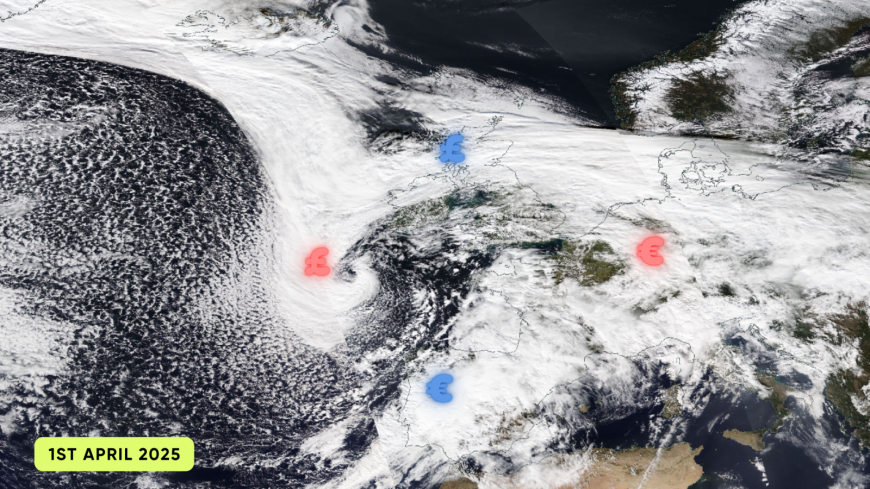
In a groundbreaking policy proposal announced today, Netweather is lobbying the European and UK governments to implement what they're calling "meteorological import duties" on severe weather systems originating from the USA.
The proposal, dubbed "The Fair Weather Trading Act," would require the United States to pay substantial tariffs for hurricanes, storm systems, and atmospheric rivers that cross the Atlantic and cause economic damage to European countries.
"For too long, Europe and the UK have shouldered the economic burden of weather systems manufactured elsewhere," said Prof. Lia Orlop, Chief Meteorological Economist at Netweather. "Our research clearly shows that many of our most costly weather events begin their life cycle over USA territory before travelling across the Atlantic and wreaking havoc on our economies."
The proposal cites recent data from the European Environment Agency showing that weather and climate-related extremes caused economic losses amounting to €738 billion between 1980 and 2023, with a significant portion occurring in just the past three years.
Under the proposed system, satellite tracking and advanced modeling would be used to determine the "country of origin" for significant weather systems. Tariffs would then be calculated based on the percentage of the storm that developed in foreign airspace before reaching European territories.

"It's simple fairness," explained Netweather’s Prof. Lia Orlop. "If a country's geographical location and atmospheric conditions contribute to the formation of destructive weather that affects us, they should bear some responsibility for the costs. Why should European taxpayers foot the entire bill for American storms?"
The proposal includes a sophisticated "storm passport" system that would track the genesis, development, and trajectory of weather systems. Early estimates suggest that implementing such tariffs could recover up to 28% of weather-related damages annually.
Critics have pointed out potential challenges in the implementation, including the difficulty in determining exact meteorological boundaries and the precedent it might set for other natural phenomena.
"What's next? Charging France for the thunderstorms they export across the channel? Billing Iceland for volcanic ash?" said one sceptical meteorologist who wished to remain anonymous.
Nevertheless, Netweather remains confident that their proposal is both scientifically sound and economically justified. They’ve established a new "Weather Origin Tracking Division" to further develop the methodology. Netweather hopes to present its detailed findings to Downing Street soon, they then hope to gain support from other European weather agencies and government officials.
"In this era of climate accountability, it's time we recognised that weather doesn't respect borders - but perhaps it should respect trade agreements," concluded Prof. Lia Orlop.

Editor's Note: This article was published on April 1st, 2025. Readers are encouraged to consider the date before citing this report in serious meteorological or economic discussions.
Satellite image above from NASA worldview - October 19th 2023.
Loading recent activity...